The habits of serving Arabic Coffee are primary traditions that strongly take action in all social events, such as the gatherings of engagement, reconciliation, weddings, ceremonies, events ...etc. Coffee in Arab culture is consumed in specific rituals in which each movement carries a symbol that has a particular meaning.
Those rituals have turned into traditions that formed a heritage representing Arab culture. Those rituals also included many secrets, which we’re going to unveil with you in this very article alongside the correct traditions for serving Arabic coffee because it is very sensitive for your guests, who may leave your council quickly if you do not comply with those traditions or essentials.
Index:
2. The traditions of pouring Arabic coffee.
3. The origins of serving Arabic coffee
5. What is said when there are defects in the Arabic Coffee.
6. What is said when the Dallah runs out of coffee?
7. Putting the knife on top of the Dallah.
8. The Arab quotes about Arabic coffee.
9. The traditions of serving Arabic coffee in Saudi Arabia.
10. The traditions of serving Arabic coffee in Kuwait.
11. The traditions of serving Arabic coffee in the UAE.
12. The traditions of serving Arabic coffee in Jordan.
13. Summary of traditions of serving Arabic coffee to guests.
1. Serving Arabic Coffee:
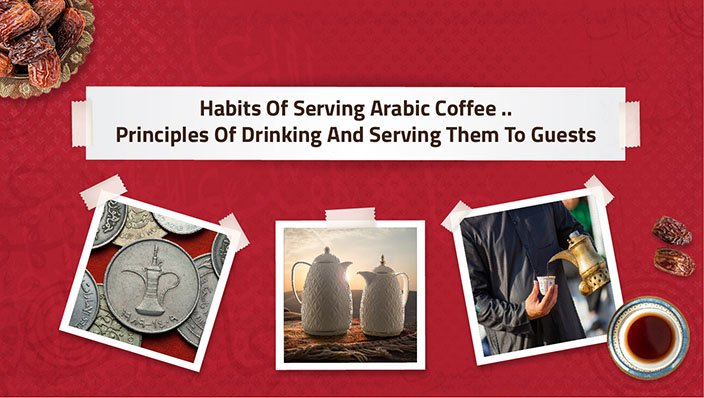
The Arabic Coffee “Qahwa Arabiyyah” is considered to be one of the generosity indicators. Therefore, it’s a vital part of the Bedouine social life as they did express happiness, sadness, and unspoken words with coffee in all of their life events, as it has many benefits, in addition, to its place in the arabic culture.
- Dallah meaning: Arab serves the coffee within Dallah which means the container we use to prepare and serve the Arabic coffee.
- Serving Arabic coffee at weddings and tribal gatherings:
Arabic coffee played an essential role in weddings and marriage proposals in Arab society. As it even had the power to solve the biggest issues and problems.
For instance, if the guest has a specific request from the host, he leaves his coffee intact. Then the host will have to ask his guest about his request. If the host has intentions to approve that request, he will have to ask his guest to drink the coffee as a sign of approval.
Moreover, The guest must drink the coffee from the host and shouldn’t directly ask for water after finishing the coffee. - Serving Arabic coffee at funerals:
In the past, the Bedouins used to pour coffee on the floor and put their Dallah upside down as a sign of mourning equals to flag downing nowadays.
Also, the guest mustn’t say “Dayem” -inferring that he thanks the host for the coffee- at funerals as the guest should wish that God blesses the dead’s soul.
2. The traditions of pouring Arabic coffee:
- “El-qahwa Khas, el-chai qass” implying the habits of serving Arabic Coffee. In public gatherings, we must give the first cup of coffee to the oldest. But in private gatherings, we must give it to the tribe Sheikh or the most notable, while we give the first cup of the tea from far-right to the left.
- "Kafa” or Shake the cup: this is the way used by guests to express that they don't want more coffee. Otherwise, the host will continue pouring coffee over and over again.
- "Sabbat Al-Heshma”: that means in the habits of serving Arabic Coffee, the amount of coffee poured into the cup should not exceed one-third of it, which is known as “Sabbat Al-Heshma”, and no more than half of the cup should be filled, because if the amount exceeds that, the guest will understand that he is not welcomed there and he must drink his coffee and leave.
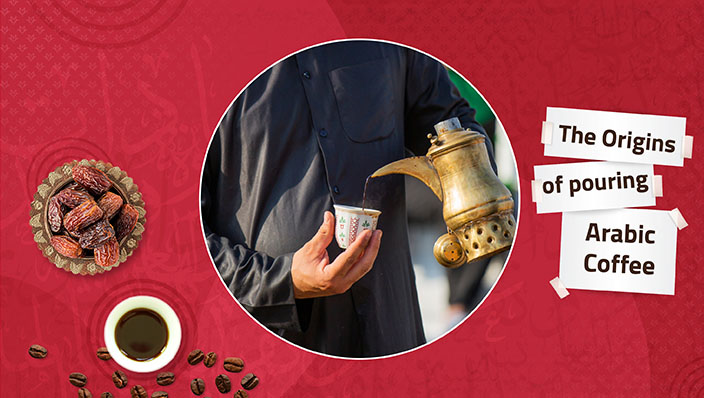
3. The origins of serving Arabic coffee
- The one who pours coffee should hold the Dallah with his left hand and the cup with the right hand.
- The cup beats against the front of the Dallah to make a ring that makes the guest pay attention to the coffee served for him.
- The guest straightens out from his standing for coffee, and when he doesn't want more coffee, he shakes the cup and the host understands that, otherwise the host has to keep pouring repeatedly.
4. Arabic coffee cups' names:
Arabic Coffee traditions in Arabs make the host serve coffee for guests several times, each cup has a name and the host must taste the first cup, as follows:
- Fenjan El-Heif: That’s the name of the first coffee cup that traditionally has been consumed by the host himself in the past to prove to the guest that the coffee is not poisoned and nowadays to ensure that the coffee is free of defects.
- Fenjan El-Keif: It is the first cup that the guest drinks and indicates the generosity of the host, in addition to it's one of the duties of hospitality Which is the responsibility of the host.
The guest has to drink it except in the case of hostility or the guest has a request from the host, and shame is attached to the host if the guest comes to his house and has a request and does not satisfy it. The clan sheikhs and dignitaries used to ask their guests to drink their coffee, which meant that their request would be accepted.
- Fenjan El-Keif: It is the second cup that the guest drinks to enjoy the taste of coffee, and the guest can have it or not if he wants, and this does not cause any kind of embarrassment to the host.
- Fenjan El-Seif: the guest drinks it to indicate that he will stand with his host in case he is exposed to any harm, and many guests leave this cup and do not drink it because of the duties it imposes on the one who drinks it.
- Fenjan El-Fares: It is a cup that goes back to an old tradition among the Bedouins when asking for blood or revenge, as the sheikh of the tribe collects the youth and the fighters, and then he asks whoever drinks a cup of the one who wants to kill, that means, whoever takes our right or our blood from him.
When one of the fighters replies that he will do so, he must bring his blood or never return to the tribe, otherwise, shame and disgrace remain attached to him wherever he goes.
5. What should be said when there are defects in Arabic Coffee?
In Arabic coffee habits, the guest mustn't say in public if there is a defect in the host's coffee, due to the sensitivity of the matter among the Arabs, and it is possible to draw the host's attention to the defect without anyone feeling by saying: “Qahwatoka Saiba” and in this case, the host has to change his coffee immediately, the guest finds may find one of these defects:
- Qahwa Saida: it means that there is an insect in the coffee.
- Qahwa Gharaq: it means that The coffee is not well roasted.
- Qahwa Heraq: it means that the coffee has been roasted to the point of burning.
- Qahwa Kthearat El-maa: it’s said when too much water is added to the coffee in a high proportion.
- Qahwa Msarrabah: it means that it is the coffee deposits that remain at the end of the Dallah after the coffee runs out.
- Qahwa Dafia: it means that the coffee has significantly decreased its temperature.
- Qahwa Shaisha: it means that the coffee is poured before the solids settle in it below the Dallah.
6. What should be said when the Dallah runs out of coffee?
When the coffee runs out and the Dallah is empty, the host usually apologies to the guests in ways that differ from one country to another. In the Bedouin culture, the forms of apologies are commonly the same, they say “al Qahwa Mesarraba” which refers to the leftovers of cinnamon and cardamom in the bottom of the Dallah. In this case, the host must say:
- In Saudi Arabia: “Hakkak bel-faier mo bel-baiet” that refers your right in the Dallah that was on the fire is not in the emptied Dallah, and here the guest replies: ”El-naks mo beek Bedallah "which means the shortage is in Dallah, not you.
- In Iraq: Almokahwe goes back 3 steps and then says: “Hesatok bel- faira mo bel-baita” which refers to your right in the Dallah that is on fire is not in the Dallah which was run out. Here, the guest replies: “El-naks mo beek bel-dallah” which refers to the shortage in Dallah not you At that time, “Mokahwe” responds: “el- dallah zai'ira we makamok a’aly” which means your position is high but the shortage is in Dallah.”
- In Kuwait: the cup is hit at the bottom of the Dallah three times and says: "hakkak bel-faier mo bebaiet” Your right is in the Dallah on the fire not in the one which ran out."
When we said, “El-qahwa el faira” that means, Dallah which is on the fire. But “el-qahwa el-baita” means Dallah which ran out.
One of the habits of serving Arabic Coffee in the bedouins; is putting a knife on top of the Dallah, which means that there is no man in the house. Accordingly, the guest must serve himself without asking for overnight.
7. Putting the knife on top of the Dallah
In some Arab cultures, the guest mustn't enter to eat or drink as long as there is no man in the house. Moreover, in other cultures, putting the knife on top of the Dallah means that the guest has to slaughter food and serve himself.
Some express the absence of a man by placing the cup on the top of Dallah, which means that the guest must pour the coffee himself because there is no man in the house.
This habit comes from an original tradition among the Arabs that makes them urge the guest to stay for three nights in their hospitality, but a man is required to serve the guest, works on his comfort and provides what he needs, and it is forbidden for women to serve men and provide hospitality to them.
you can know more about: types of coffee beans.
8. The Arab quotes about Arabic coffee:
- The Arabs used to say about the coffee cups and the pleasure of its drinking: "Al-awal lebasy, wa thany le ba'sy wa thales le'omasy“ which means that the first cup is for my head, the second one is for my strength, and the third is for my Amasi,”. "Amasi" refers to removing headaches, so the third cup purifies the mind and removes headaches from the head.
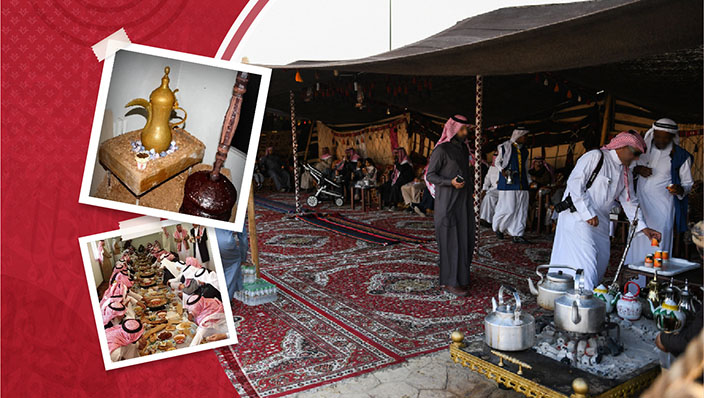
- When the guest says: “Your coffee is drunk,” that means polite thanks to the host. But if he says, “Your coffee is drunk and your coffee is upside down,” that means thanks also, but in the context of indirect reproach.
9. How to serve Arabic coffee in Saudi Arabia
Learning the traditions and customs of serving Arabic coffee on occasions is one of the essential things that all residents of the Kingdom of Saudi Arabia should learn, whether they are Saudi or non-Saudis because those traditions are essentials that must be well known to avoid any discomfort or embarrassment to the guests.
The Gulf countries commonly consider Arabic Coffee as an essential part of their cultural heritage and they have been including its traditions in their daily activities to keep maintaining and preserving it.
Therefore, Arabic coffee was registered in the representative list of intangible cultural heritage at the request of the Kingdom of Saudi Arabia, Qatar, the Emirates, and the Sultanate of Oman in the meeting that was held In Windhoek in 2015 for UNESCO.
To this day, the Saudis are proud of their Bedouin customs, which we have already referred to, and adhere to them, as follows:
- "Al-mokahwe” must have “fenjan El-heif” from the Dallah.
- "Al-mokahwe” must stand in front of the guest, He must pour “fenjan el-daif” after that “fenjan el-saif”, this until the guest shake his cup or say “tekram” that meant I don’t want more.
- Breaking the cup in the kingdom of Saudi Arabia means evidence of the guest's honor and comfort with the host, and it means that no other guest can drink in this cup after him.
Prepare Saudi coffee by following simple tips.
10. How to serve Arabic coffee in Kuwait:
Ahmed bin Barjas, a researcher in heritage and history affairs, explains many customs and secrets that many may not know, which we summarize to you as follows:
- In the past, Arabic coffee was served at the following times: from after dawn until noon, then from afternoon until sunset, then after evening prayer until ten in the evening.
- Serving coffee was restricted to men, not women.
- The first cup is the host's cup, and if the host finds one of the defects in the coffee, he has the right to withhold the cup from the guests until another is prepared.
You can know more about Arabic coffee preparation to make it in a professional way without any defects.
The guest should move the cup from the right to the left until it cools down, it’s forbidden blowing into the cup, and he should not exceed three sips in his drinking, then he can express the sufficiency by saying “Tekram” or “Bas” or “Dayem.”
The Kuwaiti researcher in heritage and history affirmed that in the past, the Arabs used to criticize those who drink too much coffee in one council, and they called him “Gheir Ra’e Keif” which means that they are not sensitive to the quality of the coffee.
11. How to serve Arabic coffee in UAE:
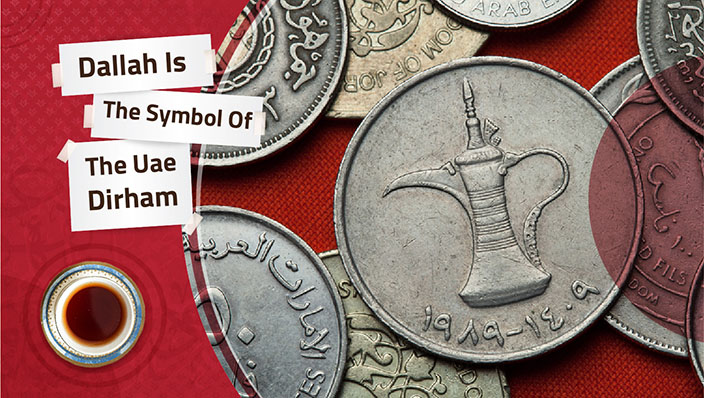
They say in Emirati proverbs: “elle ma’endo dallah ma hada yendalla” which means that people don’t visit anyone who hasn’t a thermos or Dallah at his place.
Dallah is a symbol of hospitality and generosity in Emirati culture, just as Arabic coffee is an integral part of the culture in the Emirates.
“Ghaia Al Dhaheri” a researcher in Emirati culture speaks to us about the customs of serving Arabic coffee in the UAE, she confirms that:
- Offering coffee to the guest is an honor for him, even if delicious food and drink are served to him, it is not considered an honor without offering coffee, so there is no day goes on in any Emirati house without the presence of coffee beans.
- Dallah is one of the most important tools used in the making of Arabic coffee in the UAE, so it has become a symbol in the Emirati heritage that expresses the authenticity of lineage, moreover Arabic Coffee was registered in UNESCO in the Representative List of Intangible Assets in 2015.
- The task of serving coffee is only assigned to those who are known for good manners and morals, as well as good-looking, and it must be ensured that they possess the experience, sufficient skill, physical and mental ability to do this work.
12. How to serve Arabic coffee in Jordan:
Arabic coffee is one of the pillars of hospitality in Jordan, and the following are the customs of serving Arabic coffee among Arabs in Jordan:
- “Al-Fidawi” is a specialist in making coffee.
- The host must bend slightly when pouring the coffee so that the cup is within reach of the guest, about this point, historian Dr. Muhammad Abu Hassan says:
“I remember in this that I was a guest at one of the houses in an area located in the south of Queen Aliaa International Airport, and the coffee man did not bend over when he offered me the cup, so the host noticed that, and dispensed it from the house and apologized to me, and insisted on offering me a coffee with his own hands and standing up In front of me until I finished it and shook my cup.”
- Coffee is the key to speaking, so the guest and the host should not take a break in speaking until the guest drinks the first cup.
- It is a shame that one of the guests is left without being poured with coffee, so the host must be very skillful and his eyes like a falcon, while he can rotate on them straight and steady.
- The coffee is poured into the cup slowly so that it is in a fine thread that does not break between the cup and the cup so that the guest enjoys the view of pouring coffee.
- Jordanians say about the customs of serving Arabic coffee: “el-qahwa kas mesh khas Hata law Abo El-Yazeed.” which mean the coffee is poured from the right to left, and we don’t choose a person appointed to his position Even if he is “Abu Al-Yazid”, the start is with those on the right of the guest and the direction is left.
But if there are strangers, the coffee becomes: “Awaloha khas wa thaneha kas” which means we choose the person who we give him the first cup of coffee, but the second one we start from the left to the right.” While in the tribal gatherings we must pour the first cup to the Chieftain then the individuals.
- In this, researcher Suleiman Ahmed Obaidat confirms that it is wrong for a coffee man to forget any person when serving coffee, whether it was by mistake or intentionally unless that person fled the battle or did an act of shame.
- The coffee is poured into the cup in a small amount, up to an amount equivalent to what a tablespoon can fill with, and this is due to the generosity of the Jordanians, as they describe the amount of coffee in the cup as a “shaffa wa haffa”, which means for them that you “tshef shaf thomma tahef haf” and the cup of coffee ends.
Their philosophy is that Dallah should suffice all seated people, as coffee is one of the dear things, and when the coffee man fills the cup of coffee that indicates, he is full of anger, which is a shameful and outrageous thing.
- The guest should return his cup of coffee to the coffee man hand in hand, therefore he mustn’t put the cup aside except the tribal gatherings.
- When the groom goes to ask for a girl and the coffee is placed in front of his family, they do not drink it at first, and here the host asks them about the reason for not drinking their coffee, their representative answers and gives greetings and starts the conversations. After the agreement and the answer, the host takes the initiative by saying: “Pour the coffee” and invites his guests to drink coffee after pouring the poured coffee into the Dallah and reheating it.
13. Summary of the traditions of serving Arabic coffee to guests:
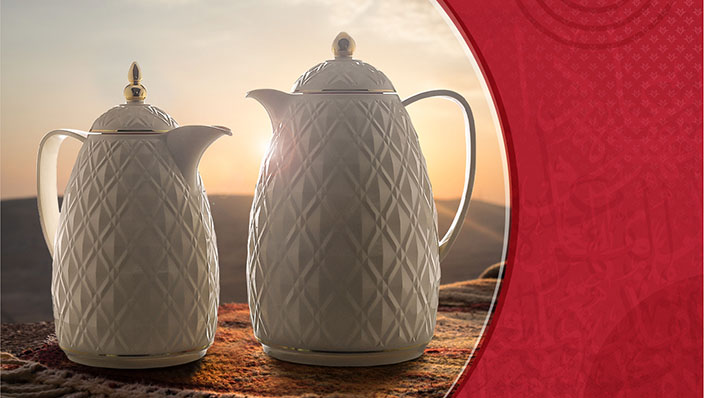
- It is preferable to put small tables in front of guests to make it easier for them to have their coffee cups.
- Coffee thermos and cups without saucers can be placed on an elegant tray.
- Do not place more than one set of coffee cups on one tray.
- The host should bend a little when pouring coffee in front of the guests.
- Hold the Dallah with the left hand and the cup with the right hand.
- Avoid giving the cup to the guest before it is poured into it. The cup should be poured first and then served to guests.
- The host must wait for the guest to drink their coffee, but also the guest should not let the host wait too long by becoming preoccupied with talking.
- If some drops of coffee fell, you can wipe it with paper tissues without anyone noticing.
- The host should taste his coffee first before serving it to his guests to be sure of its quality.
- You must use the best thermoses in preserving the temperature to serve you Arabic Coffee.
- When pouring and serving coffee, you must observe all the principles and rules that we mentioned, which differ today from one country to another.
you can also know more about the thermos prices, and the way of pricing the thermoses.
Finally, it’s clear that the traditions of serving Arabic Coffee are deeply rooted in our societies as it has been implanted by our ancestors' hundreds of years ago and adherence to those traditions and principles makes drinking coffee as enjoyable as its origins. You can also know more about house guest rules to make your guests feel comfortable.

